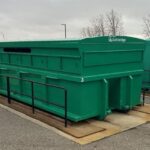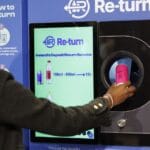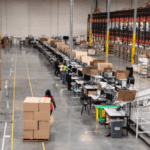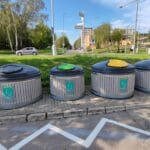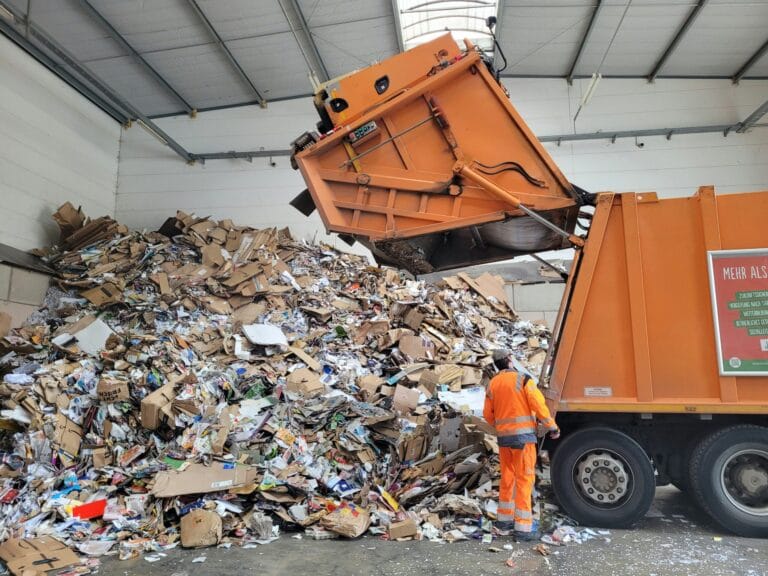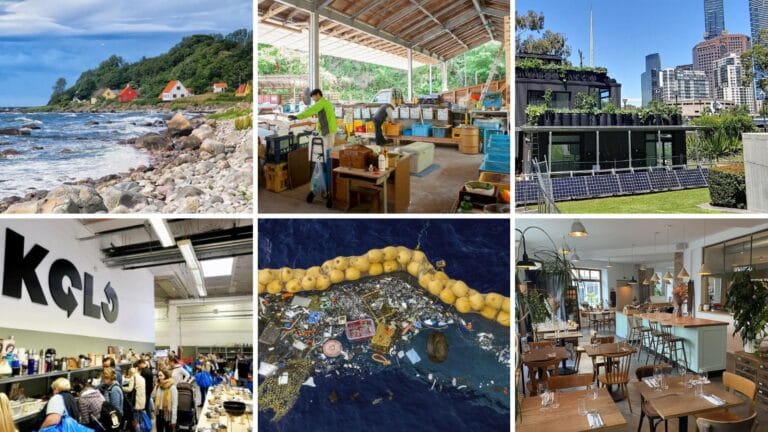Overview and results of Deposit Return Schemes in Europe

The current state of DRS implementation among European countries can be divided mainly based on three factors: countries with DRS already implemented, countries that have adopted the legislation already, and countries with ongoing discussions about DRS implementation.
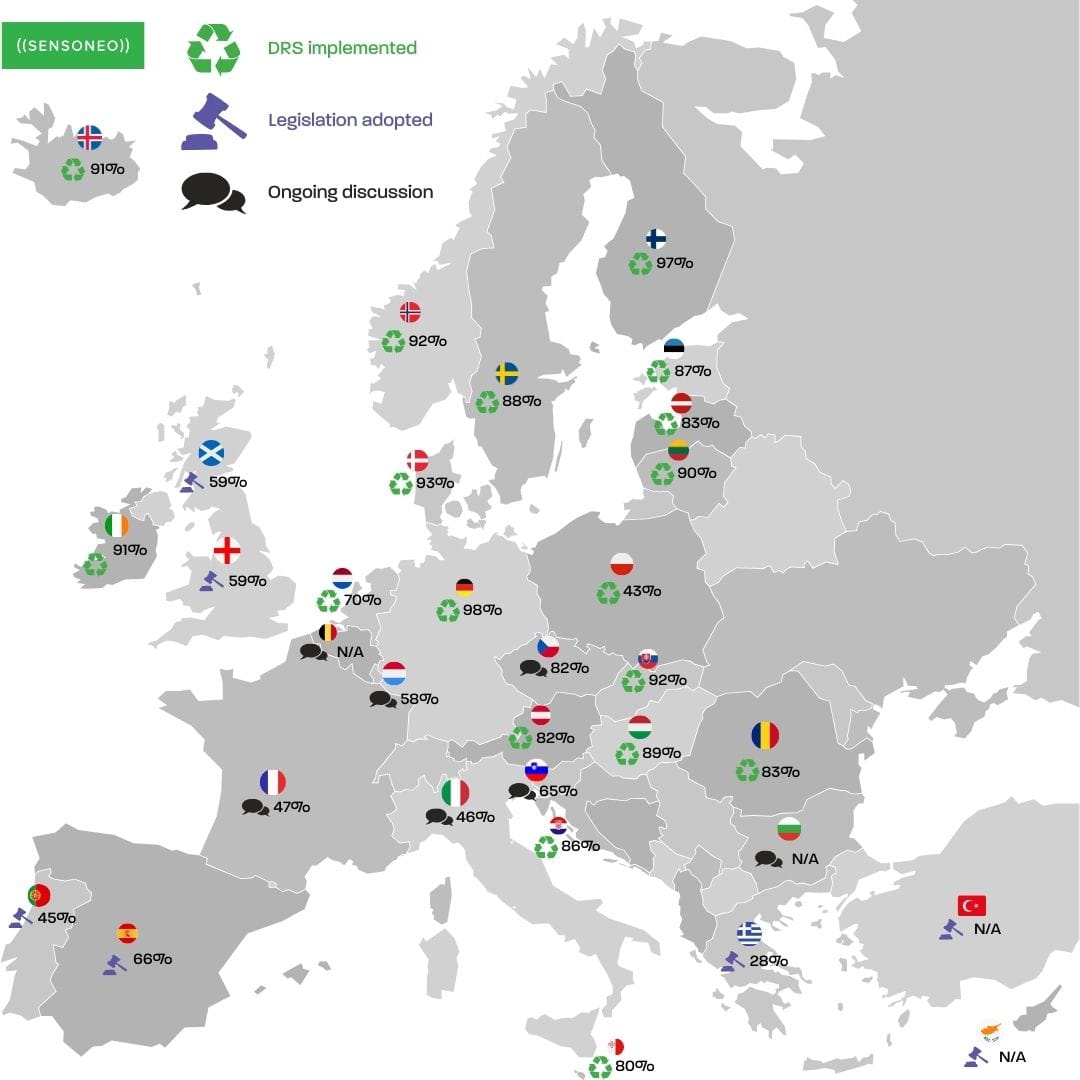
In the table below, you can find the overview of the current status of DRS in European countries, as well as the recycling rate of plastic beverage packaging among countries that already have a functioning DRS. Below the table, you can find a short description and interesting facts about the DRS status in some of the countries.
Last-updated date 10/11/2025
Note: Collection rates for Hungary and Poland which have recently implemented DRS, will be displayed once officially communicated by the respective DRS administrators.
Below you can find more detailed information on the current status or development of the Deposit Return System in each country listed in the table.
Austria launched a nationwide deposit-return scheme (DRS) for single-use beverage containers on 1 January 2025. The scheme applies to PET bottles and aluminum cans from 0.1 L to 3 L, with a refundable deposit of €0.25 per container, all marked with the Austrian deposit logo. The system is operated by EWP Recycling Pfand Österreich gGmbH, supported by technology from industry partners such as Sensoneo, which provides the IT solution enabling system coordination and data handling. Austria targets a 90% return rate by 2027, helping meet the EU Single-Use Plastics Directive requirements.
In the first year of operation, active consumer participation drove a successful 81.5% collection rate, meeting official targets.
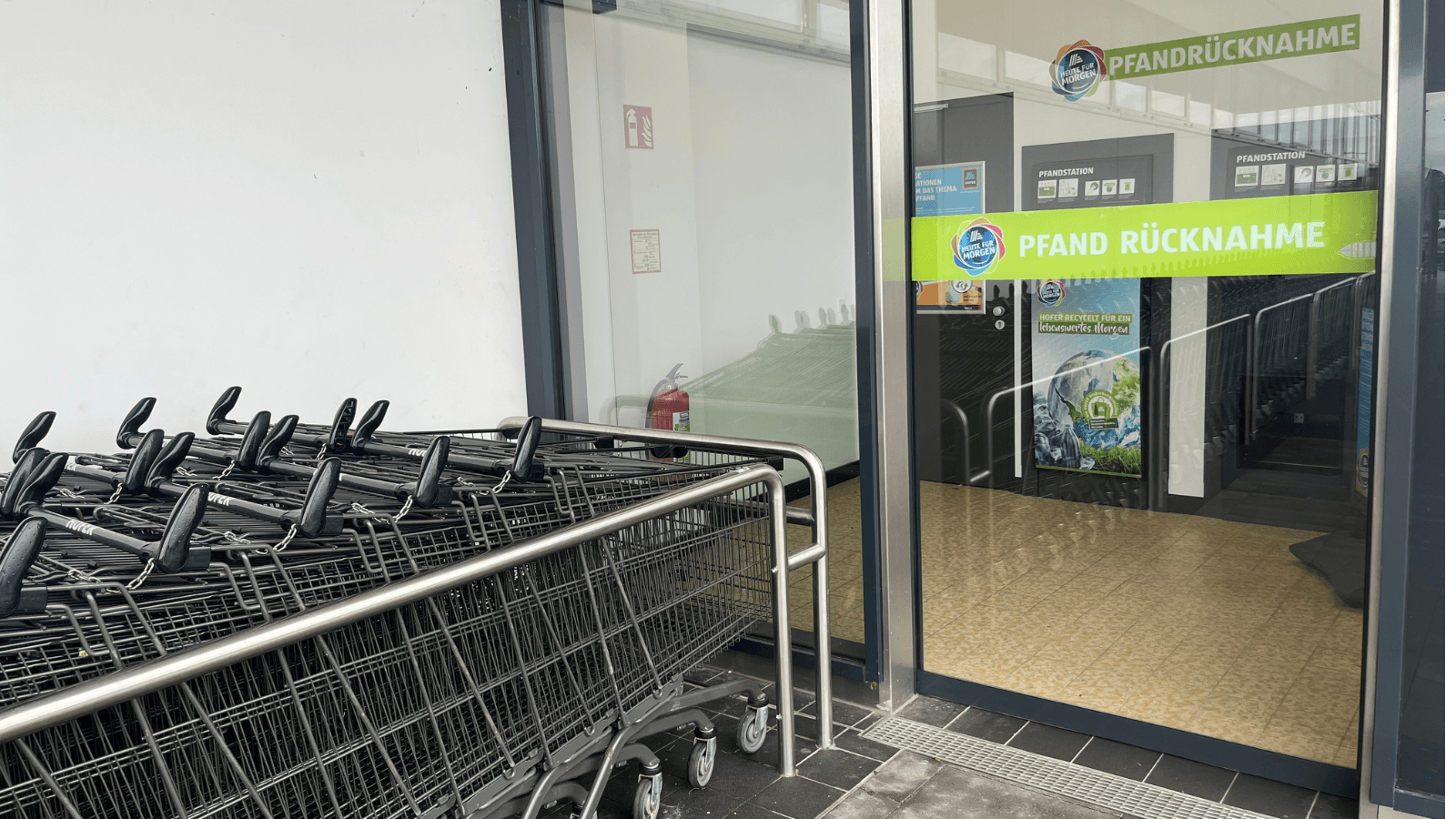
Sources: insensiv.de
Belgium was long perceived as the only EU member claiming there was no need to implement a Deposit Refund System (DRS) in the future, as the recycling rates were still considered quite high, even when plastic beverage packaging was collected from homes along with other plastic waste. Currently, there is no official whole-market selective collection rate for plastic bottles, and there are several initiatives, such as Recover—a collaboration between 11 waste inter-municipal companies and the city of Antwerp—indicating that the collection rate of PET bottles might not be as high as assumed. All Belgian regions, namely Flanders, Brussels, and Wallonia, intend to introduce deposits on cans and plastic bottles from 2025 to reduce litter. However, they are divided over whether to adopt the traditional deposit system or an alternative system using an app proposed by the Flemish government, which has sparked considerable controversy and debate. The pros and cons of the digital DRS were thoroughly analyzed in this study by Recycling Netwerk.
Bulgaria is preparing to introduce a national deposit-return scheme (DRS) for beverage packaging. The Ministry of Environment has confirmed that the future system will cover plastic, metal and glass containers from 0.1 to 3 litres, including water, soft drinks, beer and cider. An analysis is currently underway to determine the logistics model, with legislative amendments being drafted in parallel. The government highlights that a DRS is needed to increase recycling rates, reduce landfilling and return high-quality materials back into the economy. When launched, consumers will pay a deposit that is refunded upon return of the container to designated collection points, safeguarded by a unique code to prevent fraud.
Sources: www.lizenzero.eu, moew.government.bg
Croatia’s deposit refund system started in 2006 to tackle growing packaging waste from non-refillable PET bottles and cans. The deposit of 0.50 HRK (€0.06) applies uniformly regardless of container material or size for one-way beverage containers (>0.2l) made of plastic, metal, or glass, excluding milk products. Returns are made at retail points via reverse vending machines or manual collection, except for small retailers (<200m2). The system is managed by the Environmental Protection and Energy Efficiency Fund and includes alcoholic and non-alcoholic beverages.
Cyprus is preparing to introduce a national deposit-return scheme (DRS) for beverage containers. In 2023, the Ministry of Environment held stakeholder consultations on draft DRS regulations, following a public consultation launched earlier. The planned system will follow EU requirements and aims to improve recycling performance by enabling consumers to return bottles and cans for a refundable deposit. The regulatory framework is being finalized, with implementation expected after adoption of the DRS decree.
Sources: ccci.org.cy, kykloikodromio.org
Czech Republic will probably easily manage to reach the first goal of the EU single-use plastic bottles directive (77% collection rate of PET containers until 2025) even without the implementation of DRS. According to a company EKO-KOM, it reaches currently 82% thanks to its dense waste collection network. Nevertheless, the second goal (90% by 2029) can be a problem for the CEE country.
“Discussions need to be held regarding the second goal, but the amount of beverage bottles that need to be collected in addition to the current state is about ten thousand tons. This can be achieved with a whole range of measures,” the Czech Department of the Environment told EURACTIV Slovakia. To name some of them – Ministry is considering a gradual reduction in the production of mixed municipal waste and a thickening of the sorted collection network.
However, according to beverage companies, these solutions will not be enough to achieve European goals. “Voluntary collections have not been successful anywhere in the world, and the Czech Republic will not be an exception,” said Andrea Brožová, spokeswoman for the Zálohujme (Let’s deposit) initiative.
The study shows What We Waste mentioned above in this article showed that the waste of drink containers would rapidly fall with the implementation of the Deposit Refund System also in the Czech Republic – from 93 wasted packaging containers to 22 per citizen per year).

The Dansk Retursystem is a non-profit organization that is responsible for all operations related to the Danish deposit system since 2002 and is assigned by law to collect all empty one-way (disposable) packaging in which deposits have been paid throughout Denmark.
The Danish DRS has two dimensions: one for usable containers and one for one-way containers. The reusable container system consists of plastic and glass bottles without deposit marks that can be washed, refilled and reused. Almost a quarter of all deposit-marked bottles sold in Denmark are refillable.

The one-way system works based on the ABC deposit system as various pants and cans can be returned. There are different marks ‘Pant A’, ‘Pant B’, and ‘Pant C’ on bottles and cans which implies that different amounts of money are returned to the customer varying on the type of material used in the bottles and cans, and the volume of each bottle or can.
- Pant A = DKK 1.00 (glass bottles and aluminium cans less than 1 litre)
- Pant B = DKK 1.50 (plastic bottles less than 1 litre)
- Pant C = DKK 3.00 (all bottles and cans of 1–20 litres)
Pant stands in Danish for ‘deposit’ and appears on the label of the bottles or cans in the circle of two arrows. The bottles and cans marked by the Pant logo can be returned either to reverse vending machines which are located in more than 3000 stores throughout Denmark or to ‘pantstation’ {deposit return bank} where the Danes can return up to 90 bottles and cans at a time.
“Denmark has one of the world’s best deposit and return systems for bottles and cans. In an international context, we are unique in being able to collect more than 90 percent of packaging and recycle it for new bottles and cans. The expansion of the deposit system makes sense because it means including more products in a well-functioning closed cycle,” said Lars Krejberg Petersen, Managing Director of Dansk Retursystem for stateofgreen.com.

England plans to introduce a DRS by October 2027, part of a UK-wide rollout. The scheme will cover single-use plastic and metal beverage containers between 150ml and 3 liters. Consumers pay a refundable deposit, encouraging returns to designated collection points such as supermarkets. The Deposit Management Organization (DMO) will manage operations, ensuring smooth financial transaction between retailers and manufacturers. Preparations and business adaptations are ongoing, with public regulations and organizational structures expected to be finalized by mid-2025.

Sources: www.truecommerce.com, www.thefirstmile.co.uk, www.veolia.co.uk, sancroft.com
The Deposit Return System in Estonia was introduced already in May 2005. Accordingly to the article by rohe geenius relying on the data of the main packaging recycling company Eesti Pandipakend, in 2021 people in Estonia returned 293 million pieces of deposit items (plastic, glass bottles, and metal cans) through the DR system. Among all the packaging for recycling on the market, 88% of plastic items, 89% of metal items, and 87% of glass items were returned by people. From 2005 until the end of 2021, almost 4,6 billion deposit items of packaging were returned. The deposit for each item is 10 euro cents.

With a 97% return rate is the Finnish Deposit Return Scheme one of the most successful worldwide. According to PALPA, the national DRS operator, in 2023 Finland reached the return rate for reusable bottles of 97%, all refilled approximately 33 times. Cans and glass bottles reached a return rate of over 98%. DRS in Finland is supported by the beverage packaging tax.
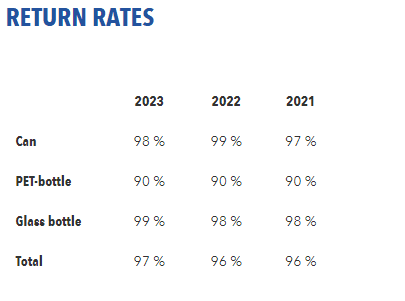
Importers and manufacturers must pay a packaging tax of €0.51 per liter on glass, plastic, or aluminum containers for water, soft drinks, and alcohol. By becoming members of the DRS, manufacturers, and importers are exempt from the beverage packaging tax. Any store that sells packages with a deposit is obliged to take the empty ones. The deposit amount is between 0.10 and 0.40 EUR depending on the type of container.

France supports implementing a deposit return system and conducted surveys in 2023 indicating strong public support. While no full-scale nationwide DRS for plastic packaging exists yet, France plans to make separate collection of household plastic packaging mandatory by the end of 2025. Ongoing policy work and pilot programs aim to align with EU goals to reduce waste and improve recycling rates.
Sources: www.acrplus.org, www.eea.europa.eu
Germany was the first big European country with a population bigger than 30 million to adopt a deposit refund scheme back in 2003 and it took inspiration from systems in Nordic countries. Germany’s DRS is reaching a very high collection rate and is including a collection of glass, metal, and plastic and the deposit (pfand) for PET bottles is €0.25, which is higher than for the glass bottles (€0.08 and €0.15).
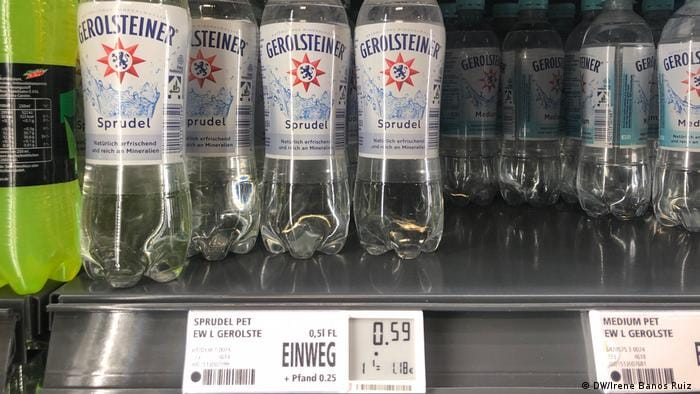
Greece is preparing to introduce a nationwide deposit-return scheme (DRS) for beverage containers, expected to be fully operational by 2026. A new non-profit system operator — DRS Hellas SA — has been established by major beverage producers and retailers, who will design, implement, and manage the scheme. The DRS will allow consumers to return empty bottles and cans at designated return points and receive a refund of the deposit paid at purchase. The initiative supports Greece in meeting EU targets for collecting 90% of single-use beverage containers by 2029 and reducing packaging waste, with the system designed as a unified, industry-run model to ensure high return rates and transparency.

Sources: eunomia.eco, www.dnews.gr
Hungary launched its mandatory deposit-return scheme (DRS) on 1 January 2024. The system covers single-use beverage containers made of plastic, metal and glass from 0.1 to 3 litres, with a refundable deposit of 50 HUF (≈ €0.13) per container; dairy products are excluded. The scheme is operated by MOL Hulladékgazdálkodási, with Sensoneo supplying the central IT system that manages data, logistics and system operations. Returns can be made at large grocery retailers and voluntary collection points, making the system convenient and encouraging consumers to build recycling into daily habits.
The REpont MOHU system achieved an 88.8% return rate in 2025, collecting over 3 billion containers.

Sources: packagingeurope.com, ceelegalmatters.com, www.tomra.com
As mentioned previously in this article, Iceland is the only European country with a return-to-depot DRS model. Even with this model, the Nordic country had very high collection rates in past years – 87% in 2012 and 90% in 2016. The numbers were going down in past years to 85% in 2016 (aluminum appr. 90%, 87% in PET, and 83% in glass) assuming this problem to the increasing amounts of tourists visiting the country and not being familiar with the deposit return system.
Ireland launched its Deposit Return Scheme (DRS) in February 2024 for PET bottles and aluminum cans (150ml–3L), with deposits of 15 or 25 cents depending on size. Operated by Re-turn and powered by Sensoneo’s cloud-based IT system, the scheme enables accurate tracking, efficient returns, and transparent reporting. In its first year, more than 1.2 billion containers were collected across 3,200 return points, boosting recycling rates from 49% to about 91% and reducing litter nationwide. The initiative continues to expand and is now viewed as a model for other countries moving toward circular economy goals.
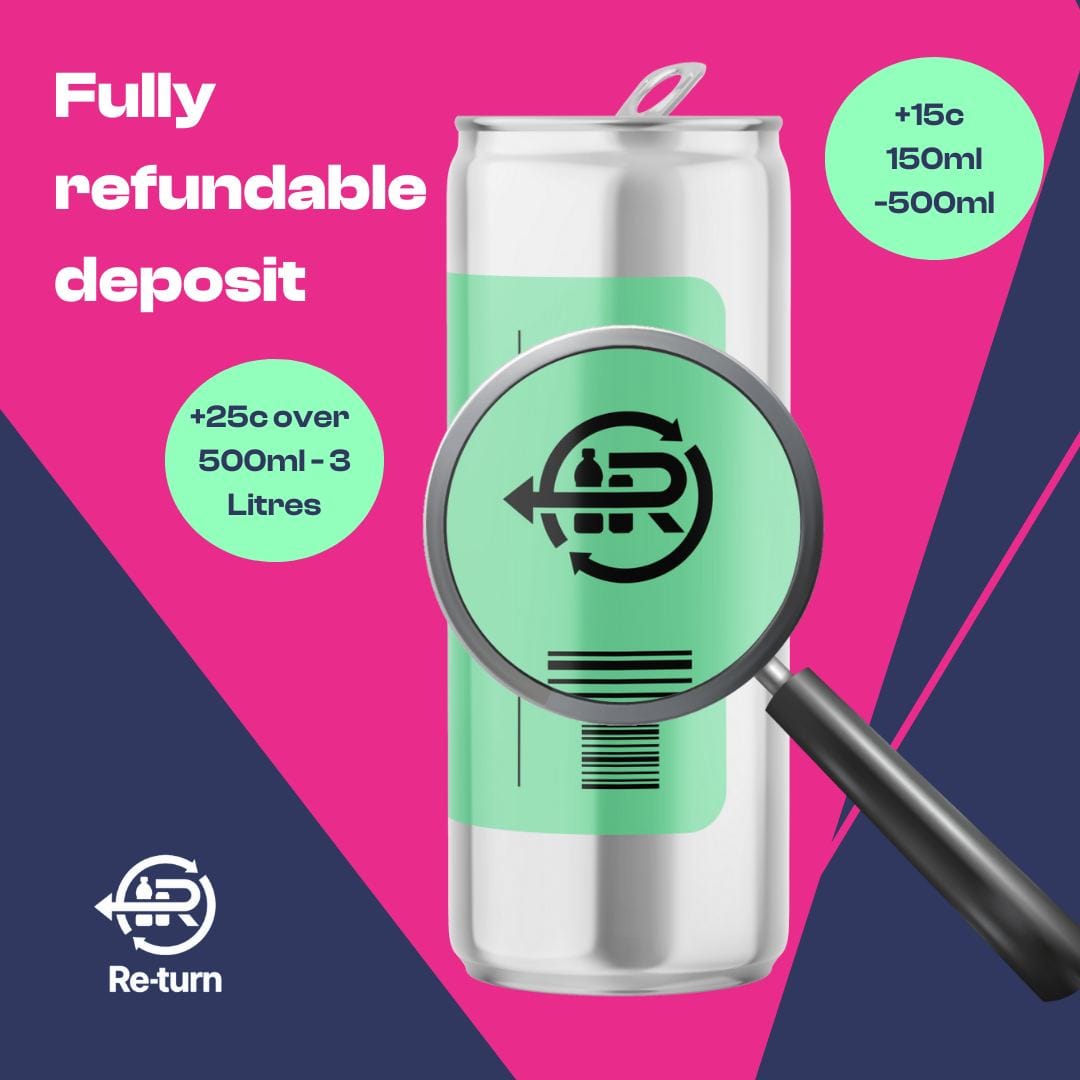
Sources: www.letsrecycle.com, re-turn.ie, sensoneo.com
Italy does not yet operate a national deposit-return scheme (DRS), but recent analysis shows strong potential benefits. According to research from ACV and A Buon Rendere, a DRS could raise PET bottle collection from about 73% to 94%, cut visible litter by around 30%, and shift recycling costs from taxpayers to producers. The scheme would also help Italy meet the EU’s 90% collection target for single-use plastic bottles by 2029 and reduce municipal waste-management expenses, estimated savings of more than €70 million annually.
Sources: eunomia.eco, recore-circpack.veolia.com
The deposit system operator in Latvia is SIA “Depozīta Iepakojuma Operators” in which various beverage companies and associations of beverage companies, as well as food retail companies, are stakeholders. The system was launched on February 1, 2022, and in the first six months of operation, there were 187,7 million items of deposit packaging (plastic and glass bottles, metal cans) in the market, of which 101,5 million items were returned by the consumers. The deposit for each item is 10 euro cents like in Estonia.
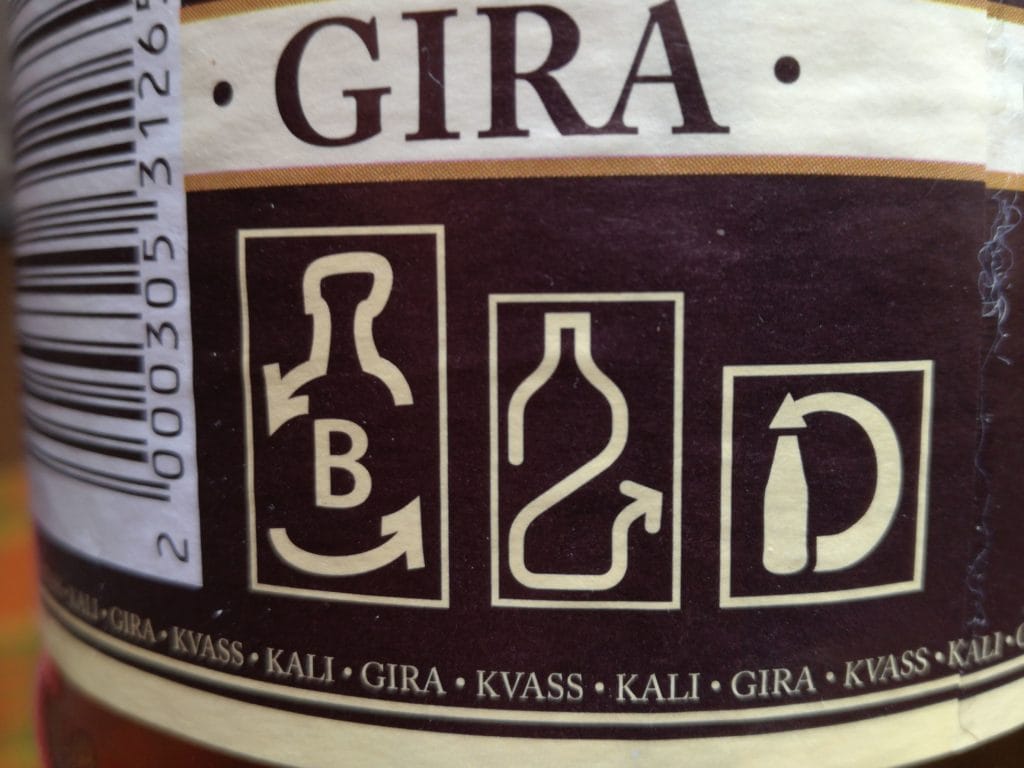
The Deposit Return System in Lithuania was launched in 2016 and it is considered one of the most modern ones in the world. During its first year of implementation, the collection rate of drinks containers reached 70% and succeeded to improve by 20% during the second year to reach a 90% collection rate in 2017. The latest collection rate reached 92% according to UNESDA.

Luxembourg currently operates a deposit-return system mainly for packaging used for the delivery of liquids and similar goods (such as beer kegs, certain glass bottles and crates). Under the amended law of 21 March 2012 (Waste Law) and the law of 21 March 2017 on packaging and packaging waste, packaging for beverages intended for human consumption and placed on the Luxembourg market are subject to a national deposit scheme, although implementation details (scope, modalities, date) still await a Grand-Ducal regulation.
Sources: cms-lawnow.com, cms.law
Malta launched a nationwide deposit-return scheme (DRS) on 14 November 2022, becoming the 13th EU country and the first in the Mediterranean to do so. The scheme is run by BCRS Malta Ltd. and covers single-use beverage containers, with public hubs of reverse-vending machines (RVMs) and participation from the HORECA sector. The IT backbone is provided by Sensoneo, which integrates all stakeholders and tracks data across the process chain. The initial 150-day results are impressive — more than 60 million containers returned, with recovery jumping from under 20 % to around 70 % — and the country is aiming for even higher collection rates going forward.
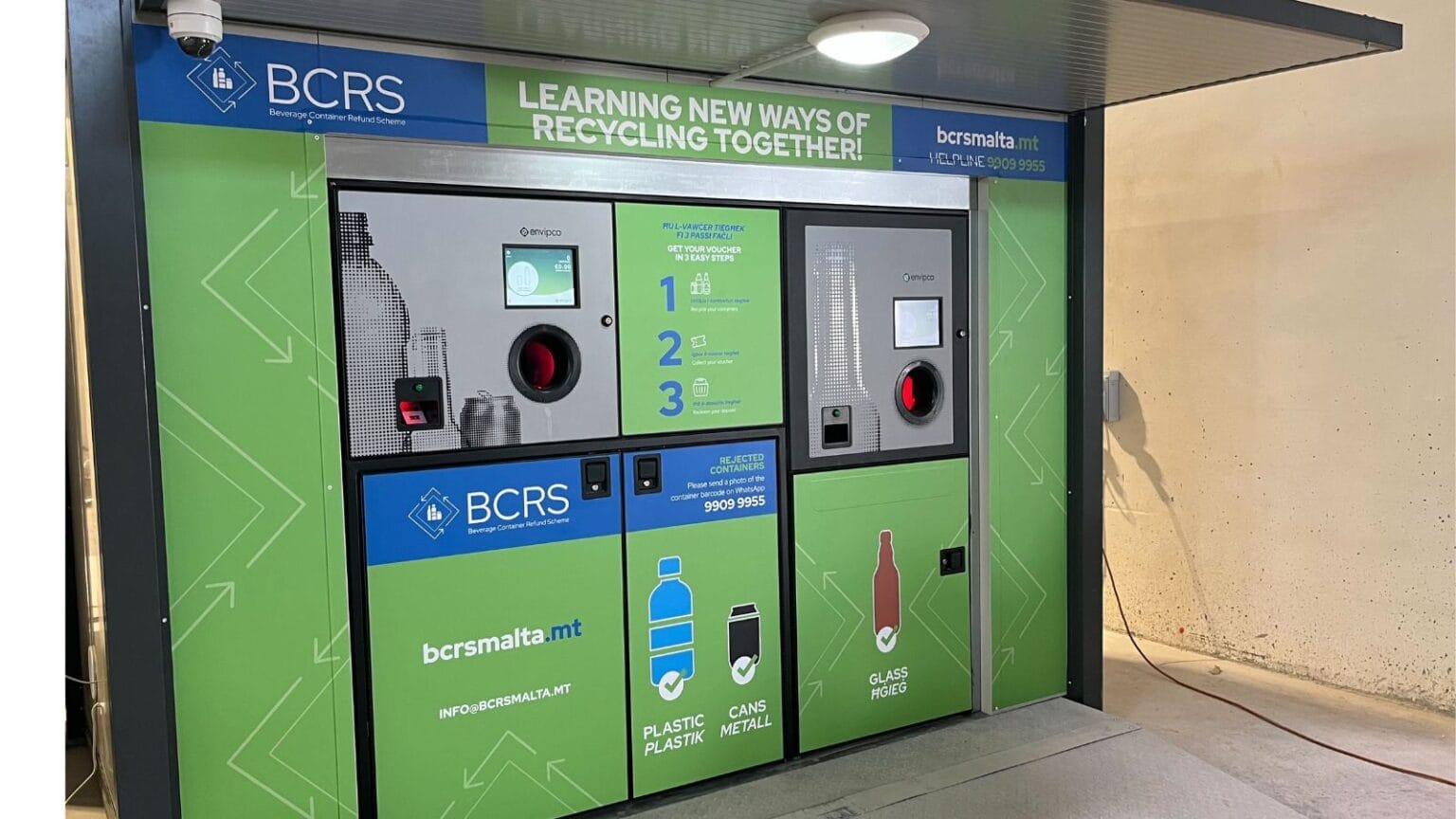
The Netherlands originally implemented a voluntary deposit return system for bottle reuse decades ago. Since 2006, a mandatory deposit system has been in place for large plastic bottles, with a current deposit of €0.25. The system expanded on July 1, 2021, to include small plastic bottles with a €0.15 deposit. Starting April 1, 2023, the Netherlands further expanded its DRS to include aluminum and steel beverage cans with a €0.15 deposit, addressing increased littering from cans. The system aims to reach a 90% return rate, incentivizing consumers through refunds on returned containers at supermarkets and other collection points. The Dutch DRS covers large and small PET bottles and metal cans up to 3 liters.

Sources: www.tomra.com, fairresourcefoundation.org, packagingeurope.com
The DRS in Norway was launched in 1996 following 10 years of discussion, development and testing. PET bottles for beverages and a small amount of HDPE and aluminum cans can be returned at one of the 3.500 reverse vending machines (RVM). 93% of the total drink containers are collected via this stream and 7% are collected manually at one of the 11.500 collection points registered in the system.
The long anticipated Polish Deposit Refund System (DRS) commenced nationwide on October 1, 2025, marking a pivotal advance in the country’s recycling and circular economy framework.
DRS includes also glass and cans, even if aluminum was not a part of previous plans. Polish officials expect a significant reduction in environmental pollution and DRS should even help to get out of the streets also small vodka bottles (known as małpki, or monkeys, in Polish), which remain very popular in Poland. An interesting fact is that Poland has adopted a different model, involving multiple operators, whereas most countries have a single operator for their DRS.
One of Poland’s officially licensed DRS operators, approved by the Ministry of Climate and Environment, is Polski System Kaucyjny S.A. (PSK S.A.) To deliver its core IT infrastructure, the backbone of the Deposit Return Scheme, PSK S.A. has selected Sensoneo
Portugal will introduce a national deposit-return scheme (DRS) for single-use beverage containers in 2026. The system, administered by SDR Portugal, is defined by Law 69/2018 and Decree-Law 24/2024 and will cover non-reusable plastic and metal beverage packaging up to 3 litres, excluding glass and products with more than 25% dairy content.
Between 7,000 and 10,000 return points are planned across supermarkets, recycling stations and HoReCa venues. Sensoneo provides the IT backbone of the system, managing data flow, logistics and take-back operations across all stakeholders. The deposit value and labelling requirements are still to be confirmed.
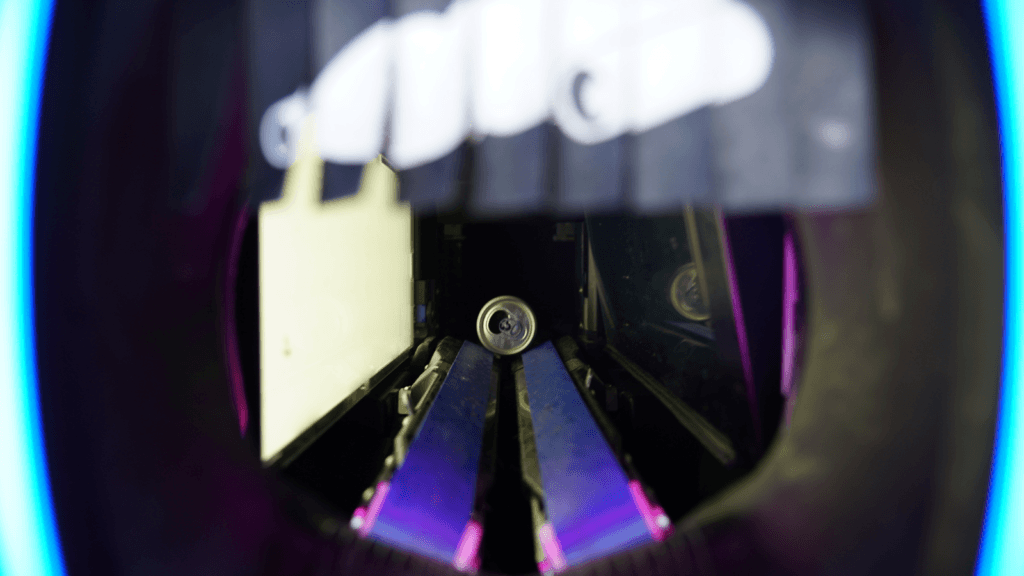
Source: www.loraxcompliance.com
Romania’s Deposit Return Scheme is the most extensive centralized Deposit Return System in the world. Romania stands out in Europe for its high number of traders relative to its population. If all beverage packaging sellers were integrated into the system, Romania would boast the highest density of collection points in Europe – one for every 220 inhabitants, far surpassing the 1,000 to 3,000 inhabitants per point in other countries with established deposit return schemes.
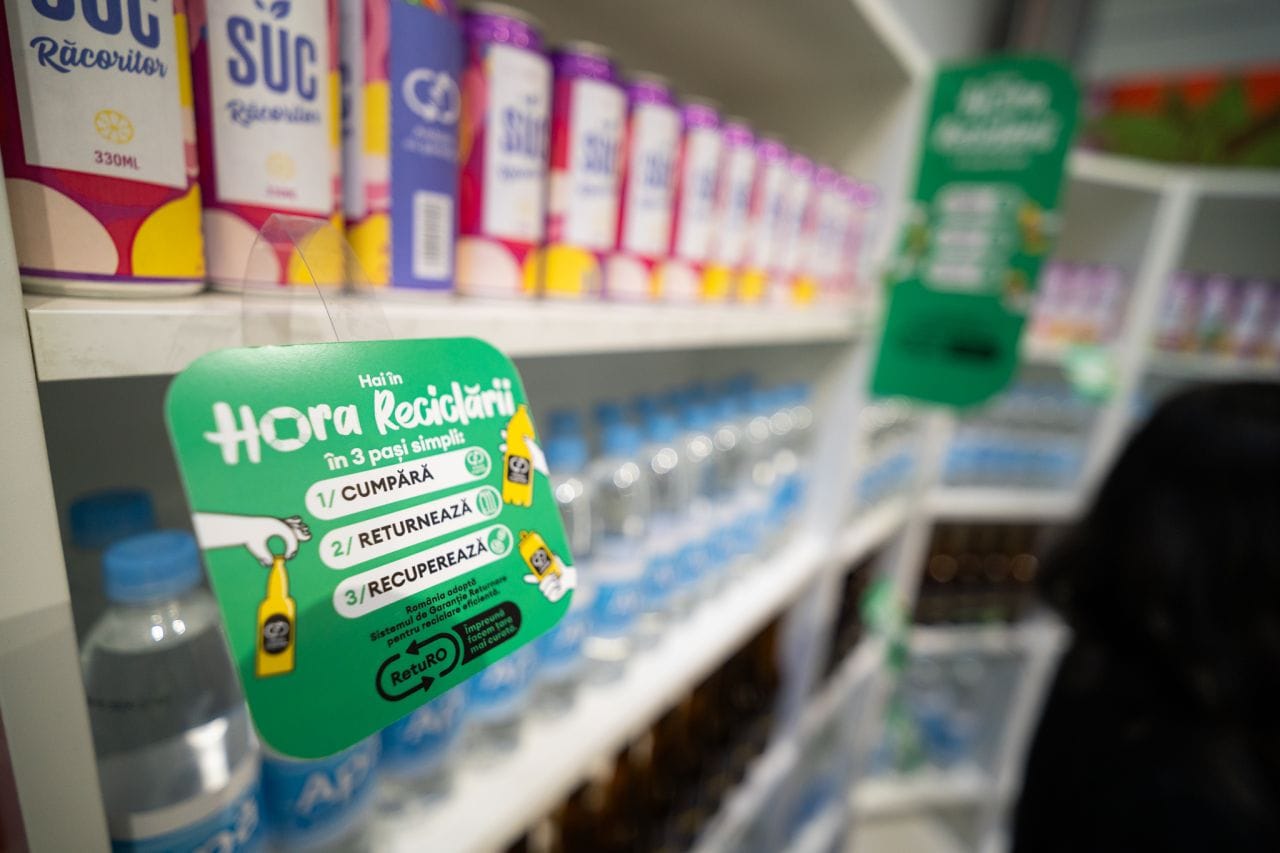
The impact of the scheme is undeniable, with key statistics underscoring its success. Today, 98% of Romanians are familiar with the DRS, 90% have returned packaging at least once, and six out of ten actively participate. In its first year of operation, the system collected over 3.5 billion packages, significantly advancing Romania’s circular economy, environmental goals, and broader societal benefits.
RetuRO reported a 2025 collection rate of 83%, with over 5.2 billion containers returned via the DRS system.
A key factor behind these achievements is the IT system developed by Sensoneo, which serves as the backbone of the entire operation. By integrating all stakeholders and aggregating data from every stage of the process, the software ensures efficiency, transparency, and seamless coordination.
Scotland plans to introduce a deposit-return scheme (DRS), coordinated with England and Northern Ireland, with a launch date set for October 2027. The system will include PET beverage bottles and aluminium/steel cans, while glass will not be part of the scheme. It is designed to reach a 90% return rate within its first three years and will be run by an industry-led Scheme Administrator, who will also determine the deposit amount.

Sources: www.gov.scot, consoc.org.uk
The history of the Slovak deposit return scheme dates back to 2003 when the first public discussion about its implementation started. Since 2019 these efforts became more tangible – the country defined a strategy with a focus on a deposit return scheme for PET bottles and metal and aluminium cans. On January 1st, 2021, the Ministry of Environment established the Deposit Return System Administrator as the managing body of the DRS in Slovakia.
DRS Administrator was created by a consortium of four non-profit professional associations representing producers and retail, that cover 80% of the products in plastic bottles and cans on the Slovak market and approximately 3.200 commercial establishments. Slovakia launched its DRS system on January 1st 2022 as the 11th European country, and it took them only 10 months. DRS IT System integrator in Slovakia is a leading company in smart waste management Sensoneo.
The return rate in the first year of DRS reached 71%, when 820 million beverage containers were collected, out of 1.1 billion containers placed on the market. The return rate during the second year of the DRS in Slovakia is already 93%.

Slovenia does not yet operate a deposit-return scheme (DRS) for single-use beverage containers, but the legal framework enabling it already exists. The new Environmental Protection Act allows the government to introduce a DRS through a decree, and although no decree has been adopted so far, the Ministry of Environment has confirmed plans to implement a system for plastic bottles and cans. Public initiatives and environmental organisations are pushing for early introduction, as Slovenia currently disposes of around 10,000 tons of plastic beverage and milk containers annually and aims to reach a 90% collection rate by 2029.
Sources: www.fiscal-requirements.com, cms.law
Spain plans to introduce a nationwide deposit return system for plastic and aluminum single-use beverage containers in 2027. This follows EU mandates requiring 77% collection by 2025 and 90% by 2029. Current collection rates are low (~41% for PET bottles), prompting government-led efforts to implement a DRS. The system will require retailers and supermarkets to provide collection points and may involve refund through reverse vending machines or manual returns. Deposit amounts have not yet been finalized.
Sources: www.lizenzero.eu
Sweden was the first country in Europe to legislate a deposit-return scheme (DRS), starting with cans in 1984 and later expanding to include plastic bottles. Today, any beverage sold in plastic bottles or metal cans must be part of an approved deposit system and carry a deposit marking showing the refundable value. Producers must ensure that their containers are registered in the system, while retailers may only sell correctly marked packaging. The system consistently achieves high performance — in 2024, Sweden reached a return rate of 87.6% for PET bottles and cans, with the national goal set at 90%.
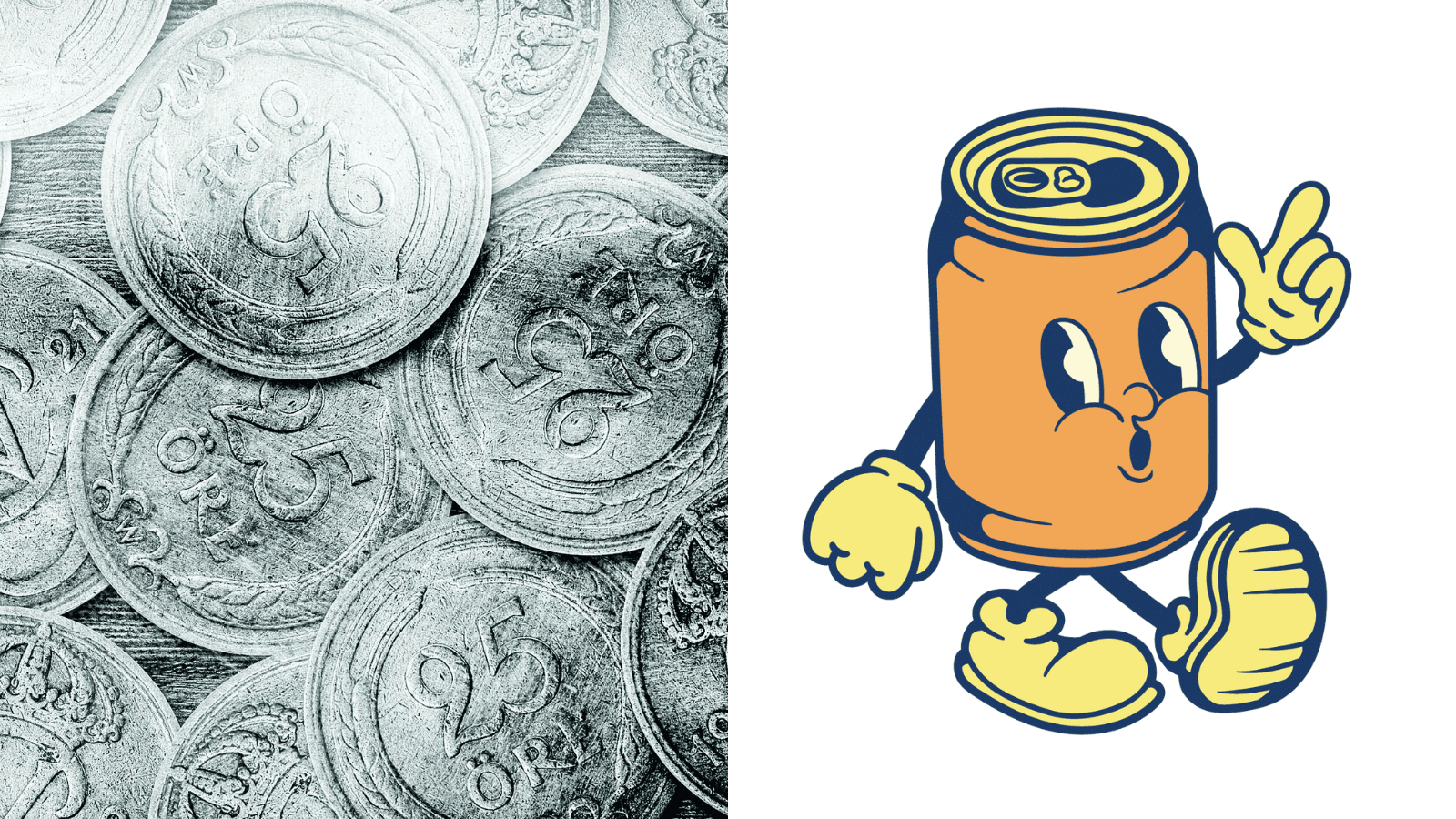
Sources: www.tomra.com, www.naturvardsverket.se, www.pantamera.nu
Turkey implemented a nationwide DRS as part of its Zero Waste Project, effective January 1, 2025. The Deposit Management System applies to plastic, glass, and aluminum beverage containers, incentivizing returns with cash refunds or shopping credits. The system aims to recycle around 20 billion single-use packages annually, involving all provinces and districts. The Turkish Environment Agency oversees the program, planning an online data tracking system to ensure effectiveness. Initial return points include shopping malls, large supermarkets, and public squares.
Sources: www.loraxcompliance.com, www.dailysabah.com
Sources of the collection rates:
Denmark, Estonia, Finland, Netherlands, Croatia, Lithuania, Germany, Norway, Sweden (2022), Iceland (2016), Belgium (2017), Slovakia (2024), Czech Republic (2022), Latvia (2024), England, Cyprus, Greece, Scotland, France, Ireland, Slovenia, Luxembourg, Poland, Spain, Italy, Romania, Austria, Hungary
Latest waste library articles

Understanding the impact of industrial waste
Environment, Industrial Waste
6 Best zero-waste projects in the world
Environment
Automated waste management helps factories reach ESG goals
Factory Waste Management
Understanding Industrial Waste: Types and Sources
Factory Waste Management, Industrial Waste
Smart Waste Newsletter
Get monthly updates from our company and the world of waste!


